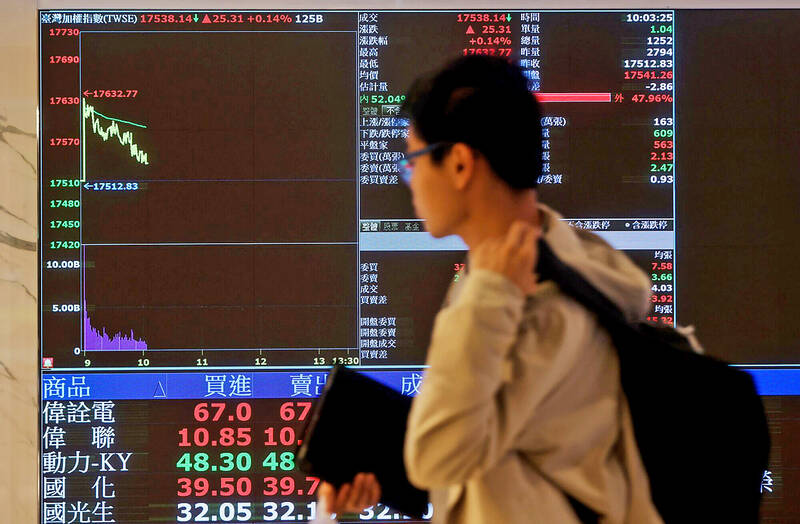Fewer retail investors entered the local stock market in the fourth quarter of last year, while more institutional investors, foreign and domestic, pushed ahead after technical consolidation in the market ended, data compiled by the Taiwan Stock Exchange (TWSE) showed on Monday.
During the October-to-December quarter, retail investors accounted for 55.96 percent of the local market’s turnover, down from 59.01 percent in the previous quarter, the exchange said in a statement.
In contrast, foreign institutional investors made up 32.74 percent of the exchange’s turnover, up 1.97 percentage points from the previous quarter, while domestic institutional investors represented the remaining 11.3 percent, up 1.08 percentage points, the TWSE said.

Photo: Bloomberg
Although market sentiment improved after November, and the TAIEX rose 1,577.07 points in the final quarter of last year, retail investors favored safer investment approaches, with dollar-cost averaging investments gaining NT$442 million (US$14.1 million) to NT$9.78 billion last month from the previous month, the exchange’s data showed.
Dollar-cost averaging is the practice of investing a fixed-dollar amount on a regular basis, regardless of the share price. It has become more popular among retail investors investing in high-dividend exchange-traded funds or local stocks with stable dividends, the exchange said.
Among retail investors, 2,973 “big players” participated in the local market in the fourth quarter, down 523 from a seven-quarter high of 3,496 in the previous quarter, TWSE data showed.
A “big player” is defined as an investor who trades at least NT$500 million in shares on the TWSE in a single quarter.
The number of “midsized players” — or retail investors with quarterly turnover of between NT$100 million and NT$500 million — decreased to 23,604 last quarter from 28,597 the previous quarter, while that of “small players,” with quarterly trading of less than NT$100 million, also fell to 4.34 million from 4.51 million, the data showed.
The exchange’s latest data are seen as an important indicator of investor confidence in Taiwanese equities, after the TAIEX’s robust performance last year, with a full-year gain of 3,793 points, or 26.7 percent.
The TAIEX yesterday closed down 199.95 points, or 1.14 percent, in line with other regional indices as concerns about geopolitical risks and Taiwan’s new political landscape after Saturday’s elections overshadowed hopes for an early US Federal Reserve interest rate cut, Capital Investment Management Corp (群益投顧) said in a note yesterday.
The index has dropped 2.14 percent so far this year.

CHIP WAR: Tariffs on Taiwanese chips would prompt companies to move their factories, but not necessarily to the US, unleashing a ‘global cross-sector tariff war’ US President Donald Trump would “shoot himself in the foot” if he follows through on his recent pledge to impose higher tariffs on Taiwanese and other foreign semiconductors entering the US, analysts said. Trump’s plans to raise tariffs on chips manufactured in Taiwan to as high as 100 percent would backfire, macroeconomist Henry Wu (吳嘉隆) said. He would “shoot himself in the foot,” Wu said on Saturday, as such economic measures would lead Taiwanese chip suppliers to pass on additional costs to their US clients and consumers, and ultimately cause another wave of inflation. Trump has claimed that Taiwan took up to

A start-up in Mexico is trying to help get a handle on one coastal city’s plastic waste problem by converting it into gasoline, diesel and other fuels. With less than 10 percent of the world’s plastics being recycled, Petgas’ idea is that rather than letting discarded plastic become waste, it can become productive again as fuel. Petgas developed a machine in the port city of Boca del Rio that uses pyrolysis, a thermodynamic process that heats plastics in the absence of oxygen, breaking it down to produce gasoline, diesel, kerosene, paraffin and coke. Petgas chief technology officer Carlos Parraguirre Diaz said that in

Japan intends to closely monitor the impact on its currency of US President Donald Trump’s new tariffs and is worried about the international fallout from the trade imposts, Japanese Minister of Finance Katsunobu Kato said. “We need to carefully see how the exchange rate and other factors will be affected and what form US monetary policy will take in the future,” Kato said yesterday in an interview with Fuji Television. Japan is very concerned about how the tariffs might impact the global economy, he added. Kato spoke as nations and firms brace for potential repercussions after Trump unleashed the first salvo of

SUPPORT: The government said it would help firms deal with supply disruptions, after Trump signed orders imposing tariffs of 25 percent on imports from Canada and Mexico The government pledged to help companies with operations in Mexico, such as iPhone assembler Hon Hai Precision Industry Co (鴻海精密), also known as Foxconn Technology Group (富士康科技集團), shift production lines and investment if needed to deal with higher US tariffs. The Ministry of Economic Affairs yesterday announced measures to help local firms cope with the US tariff increases on Canada, Mexico, China and other potential areas. The ministry said that it would establish an investment and trade service center in the US to help Taiwanese firms assess the investment environment in different US states, plan supply chain relocation strategies and